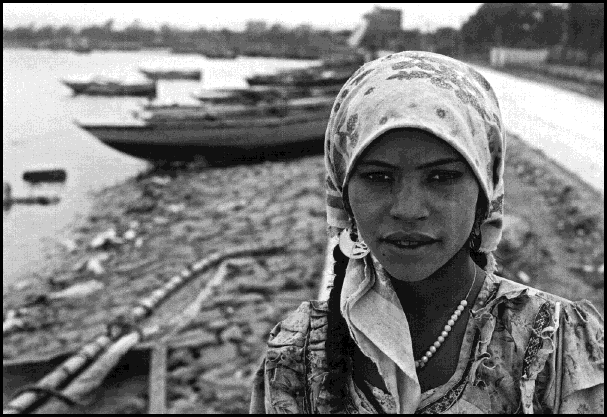
Re:viewing Egypt
Image and Echo
Xavier Roy, Photographer
Gamal al-Ghitani
Humphrey Davies, Translator
(American University in Cairo Press)

The American University in Cairo has a touch of trouble right now, what with not only the normal chaos in the streets --- have you ever spent a day trying to get to (or near) the Cairo airport? --- but now uprisings, the army on the streets, plus the regular scorching dusty anarchy that keeps everyone in a frazzle.The sewers stink; the main national products of Egypt are sweat, babies, noxious trash, overblown traffic-jams, and dung. Then there is the very bizarreness of it: Lawrence Durrell's favorite memories of the streets were the people strolling about without arms or faces or eyes or ears, also carrying about with them pendulous goiters, massive scars and scabs, long, involved port wine stains, fang-like yellowing cancerous teeth ... all desporting their various afflictions with no shame at all, none of that hide-in-the-dark that western civilization confuses with culture.
Ignoring this charming willingness to bare all, the American University in Cairo has decided to hire Xavier Roy to show the ideal Egypt. No goiters, no dust, no dying bodies on the curbsides, no boulevards bristling with taxis, buses, ancient trucks, carts, donkeys, camels, dogs, beggars ... the miasma of diesel fumes, carbon monoxide, smog and the scream of horns, the wail of engines, the cries of ten thousand kids trying to sell you bracelets, plastic pyramids, fake heads of Nerfertiti, the Pharaoh figurines made in China. And everywhere, covering all, the beastly heat and dirt that settles constantly on everything (constantly) ... making one wonder how one can survive (and breathe) in this vile conjoining of natural and unnatural gases, soot, fumes, sand, ash, smoke, pollen, gas, and other unnatural lung-destroyers.
And everywhere --- on the pavement, in the hovels, on the corners, stretched out in the trash --- those who had fled the barren countryside, coming to the big city, hoping to save a little so they can eat. Ryszard Kapuscinski described it nicely in The Shadow of the Sun
The drought had deprived them of water, and the sun had scorched their crops. They had come here, to the town, in the desperate hope that they would be given a sip of water and would find something to eat. Weak, and no longer capable of any exertion, they were dying of hunger, which is the quietest and most docile kind of death. Their eyes were half-closed, lifeless, expressionless. I could not tell if they saw anything, whether they were even looking at anything in particular.
Ah, so. Instead of giving us the straight skinny, American University has delivered a beautiful montage of black-and-white shots from all over Egypt, filled with clean and smiling children, faraway panoramic visions of the pyramids, beautiful young girls showing only their beautiful eyes behind their omnipresent burkhas, clean saw-grass fields (complete with white cygnets and perfect ruins), men in djellabas growing herbs, spices, garlic, isolated villages filled with ancient domes, men praying head down on their exquisite carpets, women in robes initialed LOVE, smiling well-washed boys perched amiably on old walls, ladies humbly poised before friezes, men on donkeys reflected in cool oasis with the full shading date trees all about.
To compound our message of peace and love, there is a wandery introduction by Gamal al-Ghitani:
To aspire to immortality, to survival after death, is a human trait. It is to take action against obliteration, against that sempiternal force that rolls on forever, that erases every living thing. In confronting this force, the Egyptians fashioned written characters, and architecture created from emptiness, from the air that we breathe, from time that elapses and returns. The words thus created were the building blocks for names, ideas, and meanings, the characters symbols parallel to existence, the writing a way of fixing it, of transporting it from one time to another, of extending existence to the utmost limit of time, where it will exist only when uttered.
"Where it will exist only when uttered."
If you hunger for your history a little fuzzy, your travel clean and care-free, your architecture from the air, your philosophy Biblical ... Re:viewing Egypt will be your dish.
--- C. A. Amantea